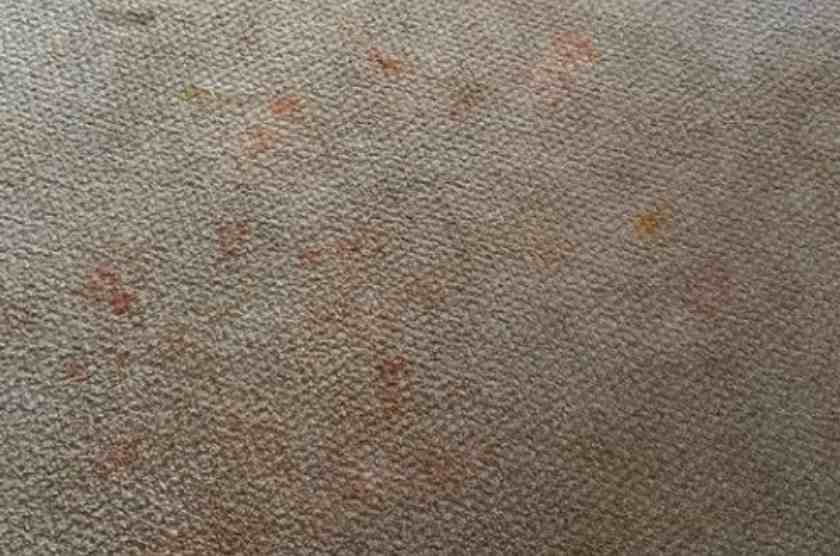Carpet Replacement and Security Deposit Laws can be confusing, so we’re here to help clear it up. If the tenant damages the carpet, do they have to replace the entire carpet or pay for the carpet? What is the law? Keep reading to find out!
This is a very common situation, the tenants damage the carpet and the landlord needs to repair or replace it. Who should pay for the replacement of the carpet, the tenant or the landlord?
The answer is…it depends.
According to landlord-tenant laws in most states, if the tenant causes damages, this includes the carpet, they have to pay to fix it. Read our article on the difference between normal wear and tear and damages.
Now, what does this mean in practice?
If the tenant spills something on the carpet and it stains, they are responsible for cleaning or replacing the carpet. If there is a hole in the carpet from a cigarette or the carpet is cut or torn, the tenant is responsible for repairing or replacing it.
However, if the carpet is worn out on the major traffic walkways, then the landlord would have to repair or replace it because this is simply normal wear and tear.
If the landlord decides that the tenants have damaged the carpet, how much can be deducted from their security deposit?
To determine how much can be deducted, the landlord should take into account how much it would cost to repair or replace the carpet. If the carpet is only stained and not torn, then a lower amount may be deducted. However, if there is extensive damage and a new carpet needs to be installed, the full cost of the replacement may be deducted from the security deposit.
What is considered extensive damage?
For example, if the tenant’s cats peed on the carpet and the bad odor can’t be removed, the carpet most likely has to be replaced. This would be considered extensive damage.
Can a landlord deduct the cost of replacing the entire carpet if the carpet is damaged?
The answer is yes but only if the carpet is brand new. If the carpet has been used for a couple of years, then the landlord can only deduct the useful life left. This actually applies to anything the tenant damages. See our article on the average life of appliances and fixtures according to the manufacturer’s recommendations.
Let’s say the carpet is 3 years old and it has a life of another 3 years left. The landlord can only deduct the cost of the remaining years it has left.
If the carpet replacement costs $1,000 and in general the carpet has six years life span, the landlord has to divide the cost of the carpet by the usual lifespan to get the per year cost. In this example, it would be $167.
This means that the landlord could only deduct $501 from the security deposit for replacing the carpet.
What can a landlord deduct if only part of the carpet is damaged or torn?
If the carpet can be repaired, and patched then only the repair should be deducted from the deposit. A good carpet repair technician can do wonders and save an otherwise good carpet.

If the carpet has small discolored spots but it’s in good condition overall, the landlord can dye it easily. AmeriColor carpet dyes and chemicals company has good information on how to do it yourself. Although it’s preferable to hire a professional and get a receipt, this way there will be no disputes on the cost of the repair.
What if the carpet is wrinkled?
If the carpet is wrinkled and or the edges start to pull away from the tack strips, this is simply normal wear and tear. It’s the landlord’s responsibility to stretch the carpet. The good news is that carpet stretching is inexpensive and it makes the carpet look much better. Many carpet cleaners offer this as an additional service.
Normal wear and tear on a carpet also include fading especially in sunny areas, this is also the landlord’s responsibility to fix. Dyeing the carpet can remedy this problem if the carpet is fairly new.
Are tenants responsible for cleaning the carpet after they move out?
Unless the lease has a clause that requires the tenants to clean the carpet professionally, the tenants’ responsibility is only to vacuum when they leave.
Check landlord-tenant laws for your state-specific requirements.
Can a landlord request that tenants pay for the cost of carpet cleaning after they move out?
Yes, in most states the lease can include a clause that requires tenants to professionally clean the carpet and deliver a receipt from a carpet cleaner.
It’s important to remember that these are general guidelines and landlords should always read the actual law or consult an attorney.
Hopefully, this article has helped clear up some of the confusion about carpet Repair and Replacement and Security Deposit Laws. For more information, please consult an experienced attorney in your area.



